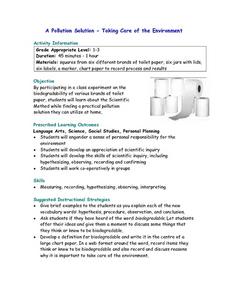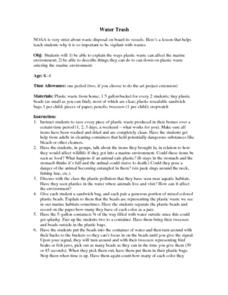Curated OER
Storage, Use, Pollution,& Clean Up of Water
Students synthesize water resource educational posters into class presentations based on the poster's theme. Working in groups, they make presentations on wastewater, water uses, watersheds, groundwater, wetlands,water quality, and...
Curated OER
Global Water
Students collect data on their household water use and calculate how many gallons of water a person uses per day. They investigate how students in different parts of the world get their drinking water.
Curated OER
Where Does Al the Waste Go?
Students construct a sanitary mini-landfill and an open mini-dump. Over a thirty day period, they compare the two methods and determine landfills are envorinmentally safer. They observe a demonstration of burning waste. They create...
Curated OER
Acid (and Base) Rainbows
Learners are introduced to the differences between acids and bases and how to use indicators, such as pH paper and red cabbage juice, to distinguish between them. They make predictions that can be answered through scientific...
Curated OER
Marine Debris
Students perform experiments to examine if debris float, or blow in the wind. The effects of these characteristics on the marine debris are then discussed. They determine how a material can influence what becomes marine debris.
Curated OER
Testing the Waters
Students use test kits to measure the level of chlorine, iron, sulfide, and dissolved oxygen in tap (drinking) water and stream water. They post and evaluate the results of these water quality tests.
Curated OER
Lesson Six
Students investigate the importance of ocean resources and what humans need to do to maintain a healthy ocean. For this oceans lesson students participate in an activity after viewing a PowerPoint presentation on the Earth's Waters.
Curated OER
A Pollution Solution- Taking Care of the Environment
Learners examine the biodegradability of different brands of toilet paper in a hands-on activity. Through this activity they also discover the steps of the Scientific Method and use new terms such as hypothesis, procedure, observation,...
Curated OER
Victorian Homes Lesson
Learners investigate British Society in the 19th century by examining Victorian style homes. In this world history lesson plan, students observe photographs of both rich and poor Victorian homes and discuss the main differences between...
Curated OER
What's The Flow?
Students examine urban runoff and identify peak flows. They examine causes for different flow rates, and complete worksheets and a graph.
Curated OER
Water Quality and Temperature
Students are led through three activities to explore the effect of temperature fluctuations on the growth and survival of aquatic plants, clams, and shrimp eggs.
Curated OER
Water Trash
Learners explain the ways plastic waste can affect the marine environment. They are able to describe things they can do to can down on plastic waste entering the marine environment.
Curated OER
People Cause Pollution
Students investigate the effects of industry on natural features. They discuss the industrial revolution, and create a drawing of a river with one half illustrating pre-industrial revolution time, and the other half representing the...
Curated OER
Global Change — Change and Cycles Where Land, Air and Water Meet
Students participate in an experiment to define a parts-per-billion solution. For this ecology lesson, students select a second substance to create a parts-per-billion solution and observe and record their results. Students work in...
Curated OER
Transportation and Environment
Young scholars make an eco-friendly vehicle to help make transportation better for the environment. In this transportation lesson, students learn how transportation inventions are bad for the environment. They then see how engineers have...
Curated OER
Turning the Tide on Trash: Marine Debris Curriculum
Six different lessons comprise this unit on marine debris. Science, language arts, social studies, and art projects make this an ideal interdisciplinary unit. The result will be well-informed future citizens who can help make a...
Curated OER
Erosion
Fifth graders engage in some activities that will help them to identify erosion and explain the causes of erosion. They also look into ways that humans can slow the process of erosion in some cases. After a teacher-led demonstration,...
Curated OER
The Marvels of Mud
Young scientists roll up their sleeves and get a little dirty in this three-day earth science investigation. Following the scientific method, children monitor the growth of algae in pond water samples in order to determine the role that...
Curated OER
Earth: Our Big Blue Marble
Students investigate Earth and its resources. In this Earth, space, and nature lesson plan, students collaborate to design presentations on the Earth, its cycles, and how humans have impacted the planet. Images, diagrams, and background...
Pulitzer Center
Extractive Industries
Here is a chance for environmental studies classes to take a critical look at crises occurring around the globe by reading articles and viewing video clips. The human activities under scrutiny are the extraction of oil, logging, and...
Curated OER
Household Conservation/Efficiency
Hook your class up to an online home energy usage calculator so that they can estimate the amount used per month by their families. Then give them Watt meters with which they will measure the power consumption of several small...
NOAA
Build Your Own Ocean Ecosystem
Hold the sea in the palm of your hand! Amateur oceanographers work together to create models of an ocean ecosystem in the sixth and final installment in a series. Raise awareness of global ocean health issues through guided research,...
Curated OER
Dispose of Waste Properly
Students examine how to dispose of waste properly and discover how pollution affects plants and animals that live in streams. In this effects of waste lesson, students explore biodegradable detergents and the concept of dilution as the...
Curated OER
Oil Spill
Students explore an important role of environmental engineers by studying the Exxon Valdez oil spill. They experiment with different strategies in order to clean up their own manufactured oil spill.

























